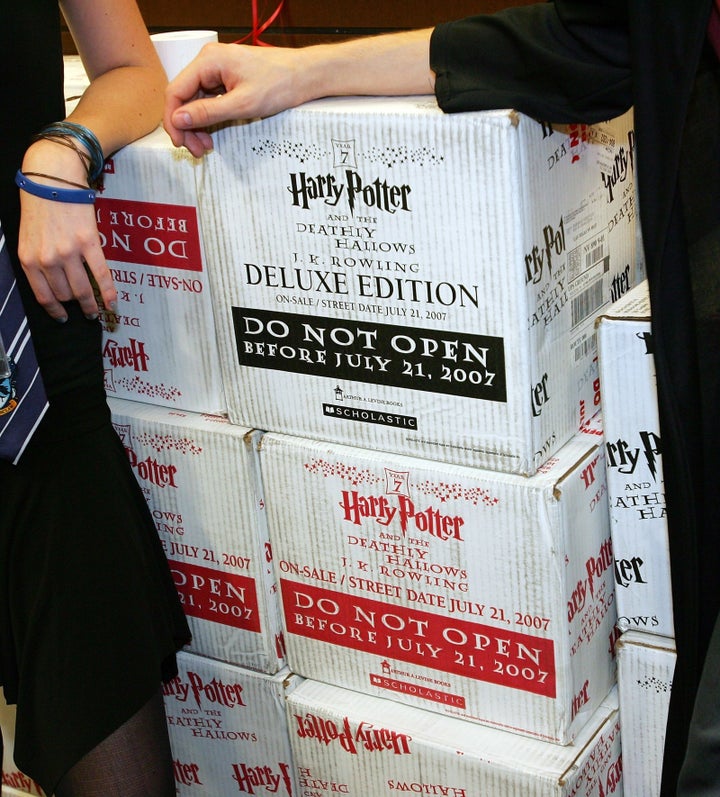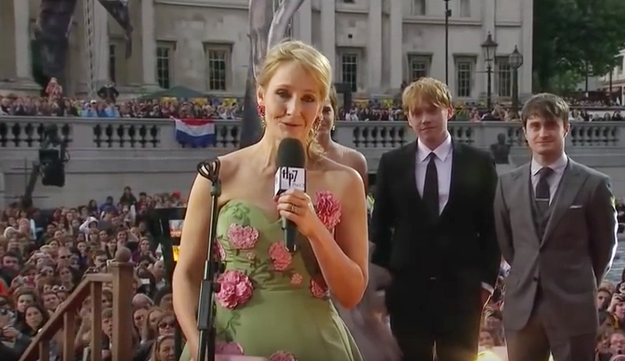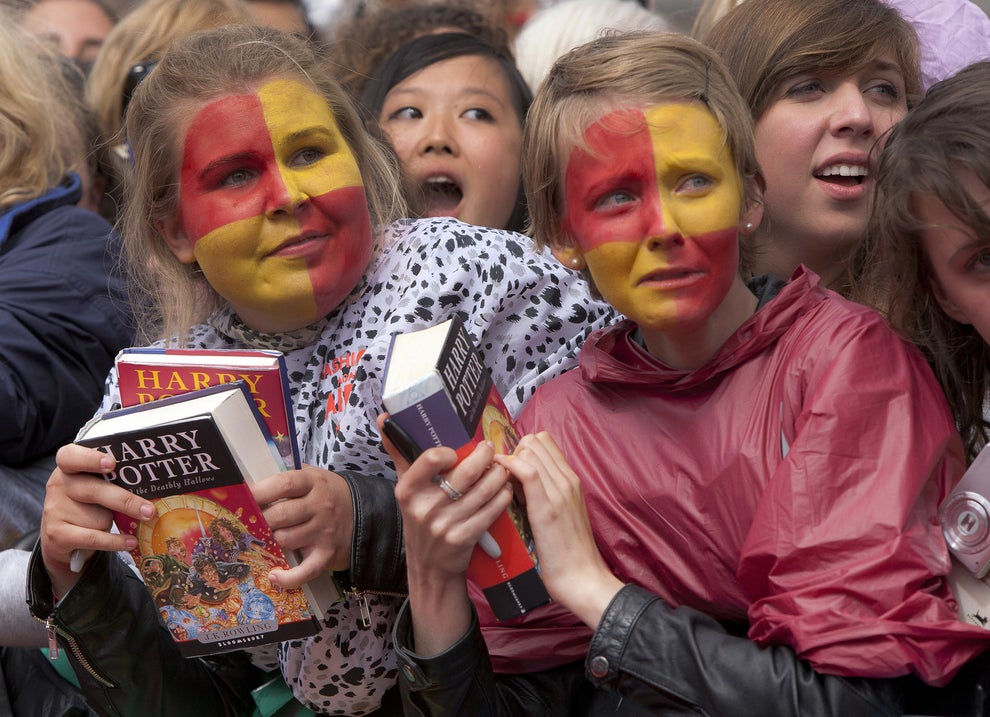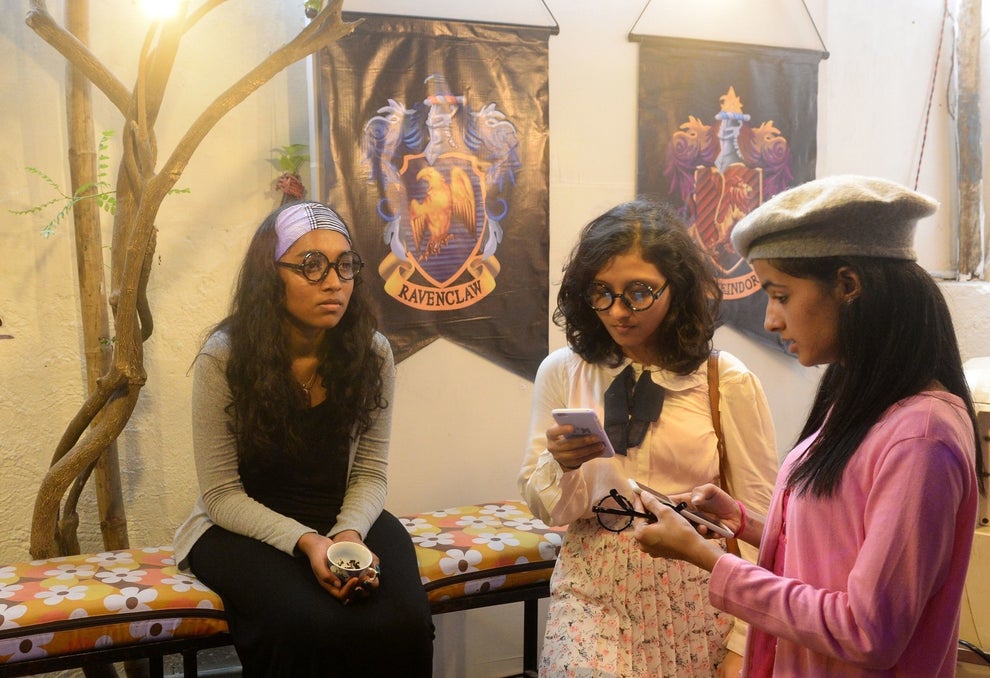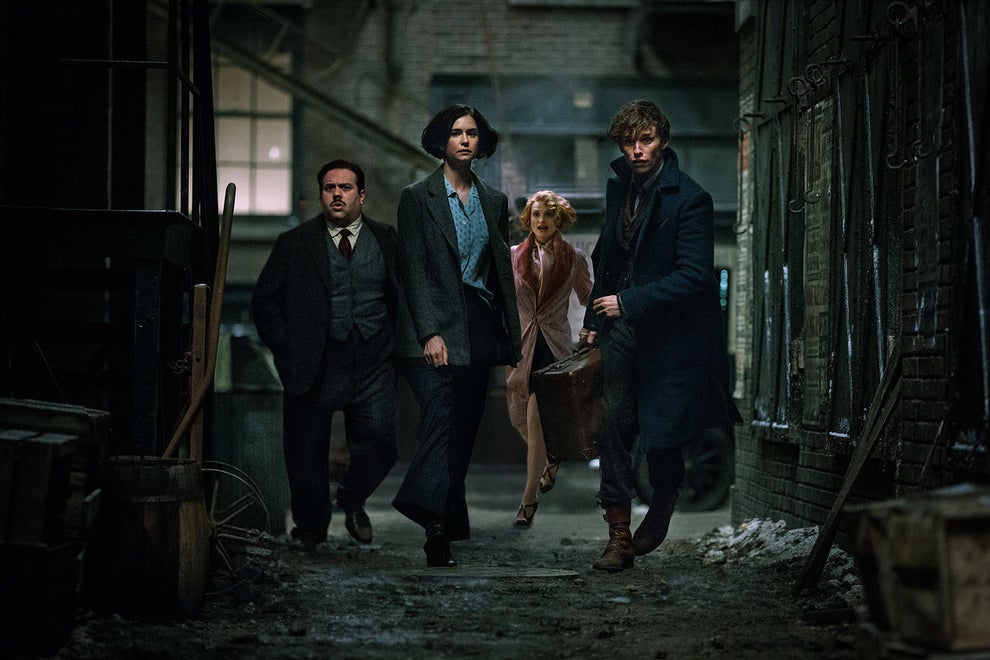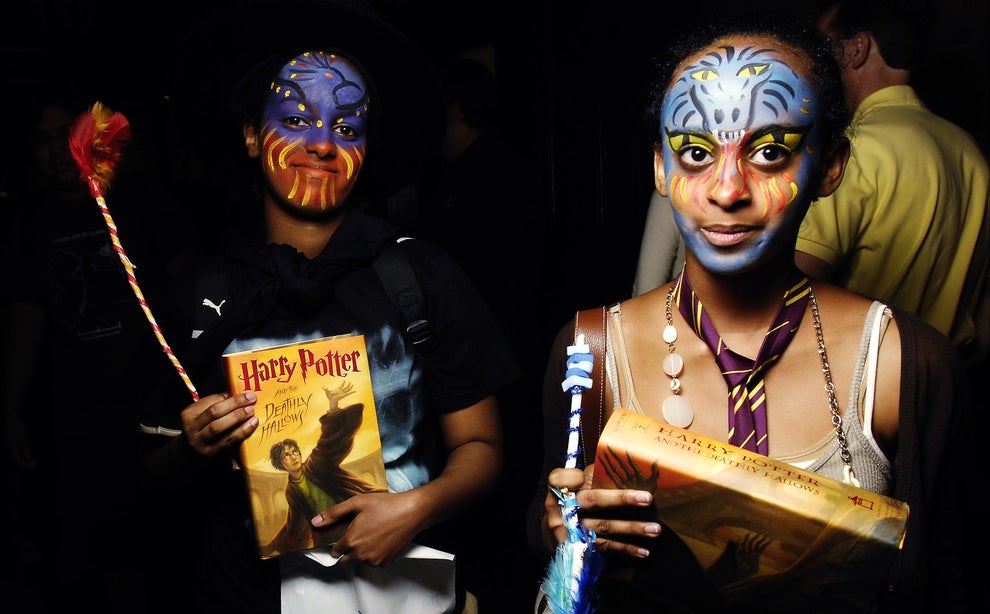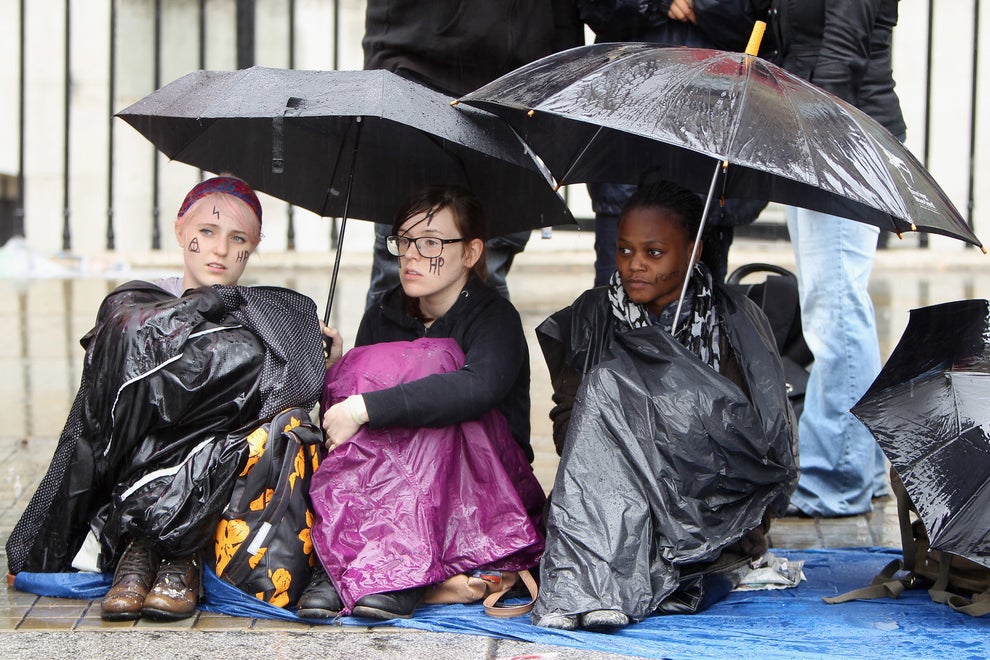
The ground is shifting under the Harry Potter fandom. Things have been rumbling for a while now — really, since the original set of films left off in 2011 up through now, with a new movie series (Fantastic Beasts), a stage play most fans still haven’t seen (Cursed Child), dozens of entries on Pottermore.com, and author J.K. Rowling’s every Twitter whim. There’s never been a more confusing time to be a Harry Potter fan, whether you’re talking about issues of representation and cultural appropriation, Johnny Depp’s presence in the Fantastic Beasts movies, or the revelation that Lord Voldemort fathered a daughter with Bellatrix Lestrange. The legacy of the original series, which launched nearly two decades ago, still holds strong, especially during a time in which people are desperate for the comforts of fiction. But even so, the fandom that made Harry Potter an icon is now deciding if the continued investment that began in 1997 is worth it. They’ve said goodbye numerous times, after all — it’s Harry Potter that won’t let go.
On a July Friday night nine years ago, fans lined the streets in front of bookstores around the world. They gathered piles of their friends and waited outside for the precise strike of midnight. Inside those stores, employees worked busily to prep for an onslaught, stepping around the big white boxes with red and black ink, speckled with stars and emblazoned with seven intimidating words: “DO NOT OPEN BEFORE JULY 21, 2007.” Harry Potter was about to end, for the very first time.
Barnes & Noble employees keep watch over boxes of Harry Potter and the Deathly Hallows as they wait for the sale date to approach on July 20, 2007. Ethan Miller / Getty Images
Five years later, it was time for another goodbye. On a stage in the middle of London’s Trafalgar Square at the official premiere of Deathly Hallows: Part 2, Rowling stood in a spearmint green dress dotted with pink flowers and made a statement that would hit the hearts of the millions watching the livestream at home. “The stories we love best do live in us forever,” she said as the core cast of the franchise wiped their teary faces behind her. “So whether you come back by page or by the big screen,” Rowling said, “Hogwarts will always be there to welcome you home.” That was July 7, 2011, and a week later, the movie rolled out across the world at midnight, similar tears marking the faces of fans as they lifted their wands to the screen — a ritual farewell to a series that had shaped their very identities.
But while the hospice period for Harry Potter was a long and emotionally arduous one, the death itself was short-lived. In fact, it was barely a nap. “When Deathly Hallows: Part 2 came out, it was about a month after I’d graduated high school,” Bayana Davis, a 22-year-old Harry Potter fan and co-host of the podcast #WizardTeam, told BuzzFeed News in a phone interview. “I was like, ‘This is literally my childhood. I started reading this at 6, and now I’m 17 and about to go to college.’” Davis and the Potter fandom were symbolically released, only to be teased and prodded for years by Pottermore — Rowling’s online proxy for the wizarding world encyclopedia she’d long promised fans. Then, there was the 2013 announcement that there would be a Fantastic Beasts and Where to Find Them movie series. Oh, and the 2015 announcement that there’d be a Harry Potter play, Cursed Child. Not to mention all the tweets and interviews in between that rocked fans’ worlds — from Rowling second-guessing her choice to pair Ron and Hermione to her tweet that Teddy Lupin is a Hufflepuff.
J.K. Rowling addresses the fans at the World Premiere of Harry Potter and the Deathly Hallows: Part 2 in London on July 7, 2011. Warner Bros Pictures / Via youtube.com
If you look around the pop-cultural landscape, it’s clear we’re in the era of the un-death. If a television series or a movie leaves us at all, the chances of it being resurrected for another round are real. Hollywood is playing around with immortality, and the (sometimes delightful) zombies of the things we once loved are everywhere, from Spider-Man to Gilmore Girls. But not every audience is built the same. Some, steadfast and engaged, have emotional, creative, and intellectual desires that become urgent once the thing they spent so much time and energy saying goodbye to declares it’s never going away.
This is what the Harry Potter fandom has been grappling with, slowly, over the past few years. And it’s a prolonged moment that’s only becoming more complicated as Rowling, Warner Bros., Pottermore, and their collaborators stretch the bounds of the wizarding world into the unknown future, dragging an interconnected web of cultures along with them. How or if they rise to a whole bevy of standards matters immensely to modern fandom — and they’re the ones taking notes (literally) on their failings and triumphs.
Harry Potter fans clutch books to be signed in Trafalgar Square ahead of the world premiere of Deathly Hallows: Part 2 on July 7, 2011. Joel Ryan / Associated Press
Back when the Potter fandom kicked into gear in the late ’90s, the internet was finding its legs right along with it. The first bit of Harry Potter fanfic to hit the legendary refuge fanfiction.net was published in 1999. When there was a break between the publication of Goblet of Fire and Order of the Phoenix — the fourth and fifth books in the series — readers were left on a three-year-long cliffhanger from 2000 to 2003, and the fandom boomed. “We had so much time between stories that we made up our own stories,” Robyn Jordan, Davis’s cousin and podcast co-host told BuzzFeed News in a video call.
They took what the books had given them and spun it out in all directions, creating sprawling works centered on their favorite characters, pairings, theories, everything. Some of it was silly and light; some of it was dark, or romantic, or twisted, or sweet, or funny, or cerebral. Plenty of it was all of the above. Much of it was incredibly thoroughly thought-out, and some of it was so well-written, it could rival Rowling herself. Some of these writings were over a million words long. This was the birth of an era in which it was commonly believed that Lily Evans was a Slytherin and Blaise Zabini was a girl – a time before the book series would come along to debunk these theories. Harry Potter was one universe, but its fandom was several more, rambunctious and active and utterly in love.
Harry Potter was one universe, but its fandom was several more, rambunctious and active and utterly in love.
At times, the creators of these fan works were galvanized by that intense love for the Harry Potter series; at others, they were inspired by what Rowling and the series couldn’t offer them, whether that was answers to their questions about where the series was going or the gut desire for a proxy who shared their experiences. Countless fics mused on Draco Malfoy’s potential redemption arc, and a surge of fan art depicted Harry and Hermione as people of color in the years before anyone in the fandom dared to dream that we’d actually get to see a black Hermione brought to life.
“When the casting of [Noma Dumezweni] was announced for Cursed Child, that was the last time I can really remember being excited,” Davis said of the December 2015 announcement that a celebrated black actress would be playing Hermione Granger on stage. “I freaked out. I almost had a meltdown in an Uber. And that was the last time I remember being really excited, because then the Magic in North America series dropped on Pottermore. … And the [Native appropriation issues] there have been really frustrating to me, for a lot of reasons.”
As with any continuation of a beloved series, the impossibility of anything new living up to the lightning in a bottle that was the original hangs in the air. But there are also the growing pains that come with a fandom that has, by and large, become adults — and taken the series’ values on that ride with them. They have come to adopt the idea that, to quote another of the undead, “with great power comes great responsibility” — even in art. That has a way of complicating things when the new additions to the wizarding narrative don’t match up with the ideals the original Potter books helped teach the fandom to explore: not only tolerance and love, but also social progress and social justice, among other things.
Davis, originally from Oakland but currently living in Chicago, is feeling pressed over the issues of representation and appropriation that are living, breathing problems the modern Potter fandom is trying to navigate. “It’s been really interesting trying to juggle all this,” she said. “Especially when I’m re-reading the books and still getting so much out of those.” Fans’ worries crop up not only with major new additions like the play and the movies, but also with every new addition to Pottermore. They are concerned that Rowling has the power to, for example, wipe out their hopes that Remus Lupin could still be canonically queer, with one tweet or Pottermore entry. Or that they’ll never be able to see the wizarding world grow to be more inclusive on the big screen, where it’s seen by the most people and is still centered on white characters. Davis is like many in the community right now: watching, waiting, and deliberating.
Take, for example, this past March, when those behind Pottermore published Rowling’s writings on the history of the magical community in North America as part of the lead-in to Fantastic Beasts’ New York setting. The fictional history weaved in many elements taken from the real-life traditions of Native American cultures, homogenizing the history of a host of different communities and assigning wizarding world “explanations” to things like skin walkers — in her version, they’re Animagi whom nonmagical people slandered with rumors of evildoing. Across social media, the response was overwhelmingly negative. “It’s not ‘your’ world,” Adrienne Keene — the Cherokee scholar, writer, and activist behind the site Native Appropriations — tweeted at Rowling at the time. “It’s our (real) Native world. And skin walker stories have context, roots, and reality.” Soon after, she tweeted at Rowling again: “You can’t just claim and take a living tradition of a marginalized people. That’s straight-up colonialism/appropriation.”
Rowling never responded directly to the backlash.
Harry Potter fans take part in a pre-launch event to mark the release of Harry Potter and the Cursed Child in Mumbai on July 28. Indranil Mukherjee / AFP / Getty Images
With the Harry Potter franchise, it’s not an issue of quantity — it’s one of quality. The community around Harry Potter is used to being overwhelmed by material. They were revolutionary in that field, innovating what it meant to be a fan in the age of the internet, and serving as a gateway to many of what we consider the major fandoms and pop-cultural phenomena of the past decade. “Back then, we had a feeling that Harry Potter was never going to go away. But we thought that it would be more of a metaphysical state of being,” Melissa Anelli, author of New York Times best-seller Harry, A History and founder of Potter fan conference LeakyCon, told BuzzFeed News over the phone this November. “We thought it living on would just be us loving it forever. We had no idea what would happen.”
Death, however, is embedded in every bit of Harry Potter. So what does a community with so much baggage do when it’s said goodbye, only to immediately be pulled back into the orbit of Rowling’s latest version of the wizarding world — especially when it hasn’t kept up with the generation that turned it into a phenomenon in the first place? “We have to ask ourselves if they’re taking advantage of the audience they have while not meeting the standards that they set,” Jordan said.
The Potter fandom has evolved in a multitude of ways since the initial rushes of Pottermania, but Anelli posited that “the biggest thing is that we are more accepting of the notion that it’s OK to dislike something about your fandom.” She added, “A couple of years ago, whenever you’d voice opposition you’d be shouted down.” Anelli described fan spaces now, in contrast, as championing “more varied opinions, more discussion, and more complicated feelings” than ever before. That notion was present and accounted for at the 2016 LeakyCon, held this past October in Burbank, California. Programming on Saturday featured back-to-back panels: “Cursed Child Was Great and So Can You” at noon, followed by “We Deserve Better: Why It’s Okay to Reject Cursed Child as Canon” at 1 p.m.
Now, the Potter fandom has crafted a legacy of engagement and creativity that the series’ modern canonical efforts are struggling to live up to.
There has long been a certain duality in fan communities, but it’s grown more pronounced in recent years, as communities settled into spaces like Tumblr, shifted their expectations, and raised the moral bar on which they judged their media. Now, the Potter fandom has crafted a legacy of engagement and creativity that the series’ modern canonical efforts are struggling to live up to. For so many fans, especially those at that second LeakyCon panel, it can be hard to get hype about Cursed Child when they recognize in it so many of the tropes they explored themselves a decade ago – in content they created and championed. And when, for just one example, Cursed Child visibly hastened to present the intense central love between Draco’s son and Harry Potter’s son as platonic — whereas fans had been writing and rewriting their relationship for years, and fandom, Harry Potter and beyond, has long pushed for more queer representation in media. In the days after the script for Cursed Child was publicly released in July, many fans reported that fic they’d read over the years sometimes felt more true to the voice and spirit of the original series than the collaboration between Rowling and Jack Thorne. “Finished #CursedChild. Not sure how I feel,” wrote Twitter user and professed fan @Umbrella_Too. “Ups & downs but it’s def not @jk_rowling style, writing or story.” To put it more simply, @SammyKeiku tweeted: “Cursed Child is the weirdest fic I’ve ever read.”
When Cursed Child did sweep in, it wasn’t the be-all and end-all of the fan community. In fact, it was a bit anticlimactic given that so few fans could actually afford the tickets and travel costs to get to London to see it — and since they’d already flocked to YouTube, years ago, to watch the unofficial Harry Potter production A Very Potter Musical and its sequels, and had already elevated that cast to the ranks of fandom rock stars.
From left to right: Dan Fogler, Katherine Waterston, Alison Sudol, and Eddie Redmayne in Fantastic Beasts and Where to Find Them. Jaap Buitendijk / Warner Bros
But Cursed Child and the looming Fantastic Beasts films still leave the fandom with something to think about. For instance: What happens when, say, Cursed Child gives Voldemort an unpopular secret daughter, or asserts that Cedric Diggory would have become a Death Eater after suffering from a basic public humiliation? Or, when a formerly beloved actor with an allegedly abusive past is cast as a major character in the latest Potter film series?
The revelation that Depp was cast in Fantastic Beasts enraged and disturbed many in the wake of the domestic abuse allegations leveled against him by his ex-wife Amber Heard this past spring. It was especially concerning considering who he’s playing: Gellert Grindelwald, who will almost certainly play an integral part in all four of the sequels. In other words: He’s an unavoidable part of what’s to come for Harry Potter.
Then came Rowling’s response to the casting: “I’m delighted,” she said at the New York premiere of Fantastic Beasts on Nov. 10. “He’s done incredible things with that character.” For many in the fandom, that dealt a visceral blow. As Twitter user @wednesdaydreams wrote on Nov. 2, “The Harry Potter universe is all about being against the abuse of power, and yet you cast a known abuser?”
Depp’s presence is proving to be a haunting issue — but it’s also one in a line of many elements leaving fans uneasy. The concerns of cultural appropriation are especially present as the wizarding world promises to traverse several continents and dive into wizarding history around the globe in the Fantastic Beasts movies and beyond — cultures and histories about which Rowling is likely not an expert. “I don’t think she has to be the one to [write all this],” Davis said. “She didn’t write [all of] Cursed Child. She could mentor some dope black writer to write the history of black American wizards. Because there’s so much mixing of cultures, and all this stuff she could connect, so many things [they] could do.”
Carmen Ejogo plays the formidable president of the Magical Congress of the United States of America in a supporting role in Fantastic Beasts, and we’re promised more of Zoe Kravitz in the upcoming movies — but the fandom is nervous that payoff for issues like representation will be too little and/or too late. “It’s important to question these things,” Jordan said. “It’s just expecting more from [Rowling], and from that whole enterprise.”
Fans pick up the first copies of J.K. Rowling’s Harry Potter and the Deathly Hallows at The Scholastic Store’s midnight release in New York, on July 21, 2007. New York Daily News Archive / Getty Images
So, what happens when the world you’ve envisioned veers too many worlds away from the “official” one you’re presented with on the big screen, on the stage, and on the page? “Right now,” Jordan said, “there’s this fight over who owns Harry Potter.”
In some ways, the future appears to be mapped out. The news that there would be five Fantastic Beasts movies in total spread across social media in late October to exasperated groans and gasps on Twitter and Tumblr as the number of years to go ticked before fans’ eyes.
No fandom has ever been a monolith of thought and feeling, but certain patterns are holding true enough to break through the fray: While many are holding on to an unfettered excitement, many too are approaching the new material with fatigue and with caution, if they haven’t already said a whole new set of goodbyes. “There’s a feeling that’s missing,” Davis said. “And it really makes me sad, that I don’t feel that thing I felt with the books. But then again, it’s not my fault that I don’t feel that.”
Fantastic Beasts hit theaters Nov. 17 — and the emotional and intellectual demands of the Harry Potter fandom likely won’t make a dent on box office earnings. But no matter how it’s received, it’s clear that there will still be issues to address as long as the wizarding world is spinning off of existing cultures and ignoring key bits of real-life history.
The people in control of Harry Potter and the wizarding world may very well choose to make the series live forever. Another project could be announced at any moment — maybe we’ll get a Game of Thrones–style TV series following the Hogwarts founders, maybe we’ll get an animated short film following a young Dobby. But the exhaustion has already set in, with four more movies and countless Pottermore entries to go.
Harry Potter fans line up for the final installment of the Harry Potter film series on July 7, 2011, in London. Dan Kitwood / Getty Images
Now, in a post-Brexit world gearing up for the Trump administration, however, Harry Potter’s role as both a refuge from the darkness and as a (debated) means to process feelings of political hopelessness is bubbling up as fandom turns toward the tenets of social action embedded in the series. The morning after the election, a fan with the handle @alexdahlberry tweeted, “Harry Potter is with me more than ever today.”
Using the original series’ allegories didn’t just pop up out of nowhere in the wake of the election of President-elect Donald Trump — the original Potter series boomed, in part, during the international turmoil of the early 2000s in the middle of the Bush administration. At the time, a sizable chunk of Harry Potter’s fans were children or adolescents just beginning to learn about real-world politics.
It’s clear that the world that gave us the Boy Who Lived will keep on living in some way or another. After all, Rowling once famously wrote, in the voice of Albus Dumbledore, that “death is but the next great adventure.” Harry Potter’s presence in our lives may never go away, but it’s also clear that both Harry Potter and its fandom are at a major crossroads, one that sooner or later will have to be confronted.
“They’ll either jump on this train or they’ll get left behind,” Jordan said of the choice Warner Bros., Rowling, and the other powers that be have in front of them. They can evolve with the times, leave well enough alone when it comes to the wizarding world, or keep creating without evolving and risk losing the core fanbase that made Harry Potter legendary in the first place.
As we enter a period already marked by fear and trepidation, fans will no doubt keep pushing Rowling and Warner Bros. to rise to that responsibility of building an inclusive, thoughtful fictional universe — if only to give us something positive to look at while our own world struggles. ●


